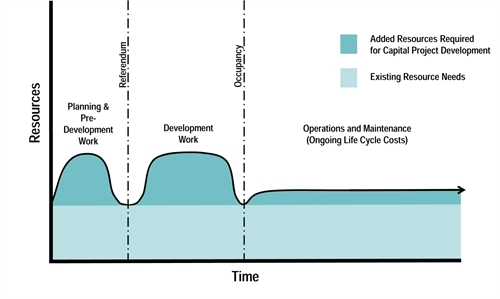
MPC
Communities around the region can collaborate on projects like public-private partnerships.
 By Erin Lavin Cabonargi, executive director, Public Building Commission
By Erin Lavin Cabonargi, executive director, Public Building Commission - March 6, 2014
On Friday, Feb. 21, 2014, I had the pleasure of participating in a valuable forum hosted by the Metropolitan Mayors Caucus and the Metropolitan Planning Council (MPC). I congratulate MPC President Mary Sue Barrett, Batavia Mayor Jeffery Schielke and their dedicated and talented staffs for organizing this exceptional event.
The forum was entitled “Breaking New Ground: Innovative Financing Strategies for Municipal Infrastructure Projects.” It offered village managers, mayors and other regional public officials an opportunity to learn more about capital project development challenges and opportunities for innovation. I am very grateful for the insights shared by the participants and want to take this opportunity to share some important ideas that were discussed and provide a few words of encouragement as it relates to municipalities and government agencies working together to provide for greater efficiencies and the best possible outcomes in capital development.
As public officials, whether elected or appointed, each stakeholder is held accountable for the stewardship of the public fund.
The public officials with whom we met were excited to plan, fund and deliver sorely needed capital assets. As we spent time discussing various capital development strategies, one viewpoint became abundantly clear: These municipal leaders hold, above all, the public trust as their greatest asset. As such, they value accountability, transparency and open competition as their highest priorities.
We learned that, all too often, municipalities are under‐resourced as they take on the most critical aspects of capital project development. Few anticipate the significant additional resources and expertise required. The reality of municipal capital development requires significant emphasis on project planning and pre‐development services that precede the engagement of design professionals or builders. Significant due diligence is required during pre‐development work leading up to a referendum and again during project development, as reflected in the double bell curve graphic below. This due diligence markedly increases resource needs in law, procurement, finance, compliance, land acquisition, entitlement, abatement, demolition, remediation, utility coordination, project planning services and more. Few municipalities have the staff expertise and capacity to perform this project-related due diligence work in addition to their other responsibilities.

As we presented at the forum, there are numerous methods for project delivery that must also be evaluated during the pre‐development and planning phase of any project. The presentation included a glossary of terms and tools for public capital development that have been made available through MPC. It is important to note that not every development tool is applicable or appropriate to every project. Each method must be evaluated as it pertains to the initial and life cycle goals of a specific project and the goals of the municipality as it balances funding availability, appetite for innovation and appropriate levels of risk transference.
What the presenters hoped to convey is that capital development is a complex specialty and the financial challenges that confront all government agencies in these times requires cooperation, flexibility and creativity in developing and implementing capital programs that will continue to provide the services that the public relies on from government.
There are numerous tools and resources available to public officials in support of these initiatives, the most critical of which is legislative. Pursuant to 5 ILCS 220, the Intergovernmental Cooperation Act of the State of Illinois, we have the ability as public entities to work together and to cooperate through intergovernmental agreement. These shared endeavors can maximize benefits and garner greater efficiency in the delivery and the life cycle of capital assets.
Stakeholders should consider bundling projects to garner greater efficiency or even develop capital assets that serve multiple jurisdictions. Do you want to remediate a brownfield site to spur re-use and regional economic development? Consider leveraging long term energy savings to pay for upfront capital costs, without additional taxpayer funding. How about partnering with your neighboring towns to develop a salt dome so you can jointly buy and store salt at off-peak times?
There are many agencies in the State of Illinois who are available to assist you in your journey (Department of Commerce and Economic Opportunity, Illinois Finance Authority, Illinois EPA, Public Building Commission, and more…). Working together we can reduce costs, share expertise and ensure that we serve as good stewards of the public fund and the public trust.
Again, thank you to the Metropolitan Mayor’s Caucus and the Metropolitan Planning Council for the tremendous opportunity to engage with these public officials and many thanks to the participants for their insights and perspective.
Erin Lavin Cabonargi serves as the Executive Director of the Public Building Commission, an agency formed through intergovernmental cooperation for the purpose of serving other government agencies. As such, the PBC is uniquely qualified to provide leadership, expertise, service and support to the capital programs of its clients in the City of Chicago and the suburbs within the metropolitan area.